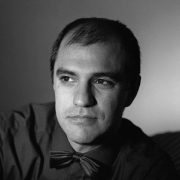From the Naxos Blog: Counter-tenorism.
December 17, 2021The human voice, Nature’s ‘instrument’, is a flexible piece of equipment. Men singing in the female sex’s natural register or ‘modal voice’ is usually referred to as a counter-tenor, sometimes a male soprano. They take advantage of the fact that the male voice can slip a gear into a female-like falsetto tone. And not just in classical music; pop musicians often resort to the technique as well. It’s been in use for centuries, so this blog will showcase a few works that feature the counter-tenor voice, some of which may well be unfamiliar, but hopefully attractive to the ear.
Before we start, however, I can hear you asking: can women perform a similar feat, by slipping into a male vocal register? Click here to find out.
Back to the men. Born in 1975, Yaniv d’Or has a distinctive countertenor voice that has made him one of the rising stars of the modern international music scene. The British-Israeli singer studied at the Guildhall School of Music and Drama in London, receiving the International Vocal Art Institution Prize and the Gottesman Award.
His Naxos album Latino Ladino was a BBC Magazine Album Choice when it was released in 2016. Its programme of mostly traditional and Baroque music that flourished in exiled communities contains the drinking song Damigella tutta bella (Damsel most beautiful) by the Italian composer Vincenzo Calestani (1589–1617), who lived and worked in Pisa on Italy’s Mediterranean coast. The city’s Sephardic community fluctuated with periods of peace and persecution. Calestani did not travel, but his dancing, three-time, hemiola-rich, tambourine-punctuated song did, reminding its audiences of the good times that always seem to come round again.
For my next example I’ve chosen an aria from Il Trionfo d’Amore which dates from a century later. It was composed by Francisco António de Almeida (c. 1702–c. 1755), one of Portugal’s most celebrated composers of the time, as a court spectacular to celebrate the King’s name-day. The aria Se bene il gelo indura l’onda is in the common da capo form that has an ABA structure. At the repeat of the A section, performers would routinely decorate the original line with complex and technically challenging ornamentation. Carlos Mena, the Spanish counter-tenor on this recording, does exactly that.
A change of pace now in music by Sergey Rachmaninov. Among his most popular compositions is Vocalise, a wordless vocal piece which originally formed part of a set of songs with piano accompaniment written in 1916 for the Russian coloratura soprano Antonina Nezhdanova. It was an immediate success, which encouraged Rachmaninov to orchestrate the accompaniment shortly afterwards.
We hear it an arrangement for counter-tenor and orchestra performed by Valer Barna-Sabadus, who was born in 1986 in Arad, Romania, and moved to Germany in 1991. He is the recipient of numerous awards, as his performance on this recording would lead one to expect.
To more contemporary sounds now in three contrasting works, the first featuring the Brazilian counter-tenor Luiz Alves da Silva. The work is Sprich… (Speak…) by Swiss composer Hans Ulrich Lehmann, who died in 2013, and it’s scored for recorder and counter-tenor. Lehmann introduced the work as follows:
“The work was written in 1993 and is based on three poems by Rose Ausländer. They are delicate, sensitive, highly expressive texts, and my composition tried to tease out these qualities. The work is dedicated to the two men who gave the first performance: Luiz Alves da Silva and Conrad Steinmann.”
And here they are, performing the work’s second movement, Perlen (Pearls).
The next work is Poems of Life, an orchestral song cycle by the American composer Kenneth Fuchs (b. 1956) who introduces the work:
“Poems of Life sets to music twelve poems from Judith G. Wolf’s volume of poetry Otherwise. The poems weave a narrative of love, the pain of loss through death, emotional transformation through grief, and spiritual enlightenment. Poems of Life is cast in five separate movements, in each of which the component poems are set continuously. The work is scored for countertenor, the protagonist of the work, and features a solo cello, the instrumental doppelgänger of the protagonist’s spirit and emotions, and a solo English horn, the spirit of the lost beloved.”
Here’s the third movement—Sisters; Forever Gone; The Retreat—performed by the counter-tenor Aryeh Nussbaum Cohen, a winner of the Metropolitan Opera National Council Auditions in the 2016–17 season, who became the first countertenor in the history of the Houston Grand Opera Studio when he joined the company for the 2017–18 season. Here he is, accompanied by the Virginia Symphony Orchestra conducted by JoAnn Falletta.
Sisters
Holding hands
across the years
we blend.
Smiling we slide down a rainbow.
Forever Gone
Borne by gentle breezes
coasting on a down draft
coating the wings of doves
carried away by the tide.
Are you in a storm cloud
in a raindrop or
in another womb
waiting to be born?
The Retreat
I look for you.
Incessantly watching
for the light
to let me know
you are near, watching over me.
But you are not in this world
as you float above the inner voice
that chatters incessantly
letting you know I scream
for you while you ignore
the world for a month
of reprieve as
we rot among
the sodden leaves
of everyday.
Finally, we turn to Requiem by Hannah Lash (b. 1981). Written in 2016, it’s introduced by the composer as follows:
“One of the things I wanted to achieve with my Requiem was to compose a piece that was at once highly personal and also non-specific. It does not memorialize any one death, nor commemorate a special person or group of people, although my own experiences of loss have left a deep impression on my concept of death. The setting of the text features a counter-tenor solo at more spare moments in the musical texture. I liked the vulnerability of the solo voice, and wrote it with the extraordinary countertenor voice of my dear friend Eric Brenner in mind.”
Here’s the Agnus Dei, performed by counter-tenor Eric Brenner, Lydia Consilvio (cor anglais) and the composer on harp.
There is a lamb in the field, bleating alone. No mother.
He waits for someone,
for some act of kindness
to forestall death.




































